British Prime Minister Boris Johnson is facing a Tory backlash after the party suffered a string of losses in the local elections amid voter anger over lockdown parties in Downing Street.
The Prime Minister admitted it had been a "tough night" as the Conservatives lost more than 300 councillors, Labour strengthened its grip on London and the Liberal Democrats made gains in Tory heartlands.
He insisted however that he would not be deflected from the task of dealing with the "economic aftershocks" of Covid, despite renewed calls from some Tories for him to stand down.
An analysis for the BBC by Professor John Curtice calculated that if the whole country had been voting Labour would have gained 35% of the vote - five points ahead of the Tories on 30% - the party's biggest lead in local elections for a decade.
However, allies of Mr Johnson argued that it would still not translate into a Labour victory at a general election.
Labour also suffered a blow with the announcement that police are going to investigate whether a party event last year in Durham attended by Keir Starmer and his deputy Angela Rayner breached Covid regulations.
The party insisted no rules had been broken after Durham Police said an inquiry was under way after it received "significant new information".
Labour's most striking gains came in London where it took the totemic Tory authority in Wandsworth, won Westminster for the first time since its creation in 1964 and clinched victory in Barnet.
It also took Southampton from the Conservatives and Worthing in traditionally Tory West Sussex from no overall control.
The Liberal Democrats took the new unitary authorities of Somerset - also traditional Conservative territory - and Westmorland and Furness and dislodged the Tories in West Oxfordshire, pushing the council into no overall control.
Mr Starmer said the results were a "turning point" while Lib Dem leader Ed Davey said they would send an "almighty shockwave" through the Government.
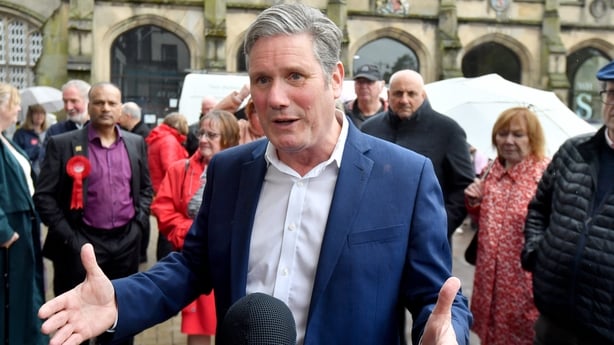
Speaking to broadcasters during a visit to a school in his Uxbridge and South Ruislip constituency, Mr Johnson said it had been a "mixed set of results" for the Tories.
"It is mid-term," he said.
"We had a tough night in some parts of the country but on the other hand in other parts of the country you are still seeing Conservatives going forward and making quite remarkable gains in places that haven't voted Conservative for a long time, if ever."
He said the "message from voters" was that they wanted the Government to focus on getting the country through the economic aftermath of Covid.
"This Government is absolutely determined to keep going with every ounce of compassion and ingenuity that we have, get people through the economic aftershocks," he said.
However David Simmonds, the Tory MP for neighbouring Ruislip, Northwood and Pinner, said the issue of lockdown rule-breaking in Downing Street had kept coming up on the doorstep.
"He (Mr Johnson) needs to find a way to restore confidence in the Government and I think there's a number of ways he might do that," he told the PA news agency.
"A change of leader would be one of them. Alternatively he needs to demonstrate what the alternative plan would be."
Mr Johnson could face a leadership challenge if 53 Tory MPs - 15% of the parliamentary party - write to the chairman of the 1922 Committee, Graham Brady, calling for a vote of no confidence.
Some MPs who previously called for him to step down have since backed off amid the crisis in Ukraine, but the results may prompt a new round of soul-searching within the party.
Veteran backbencher Roger Gale who had previously called for rebels to back off because of Ukraine, told PA that the strength of feeling against Mr Johnson may become an "unstoppable tide".
Most of the Prime Minister's critics at Westminster were however keeping a low profile as they pondered their next move.
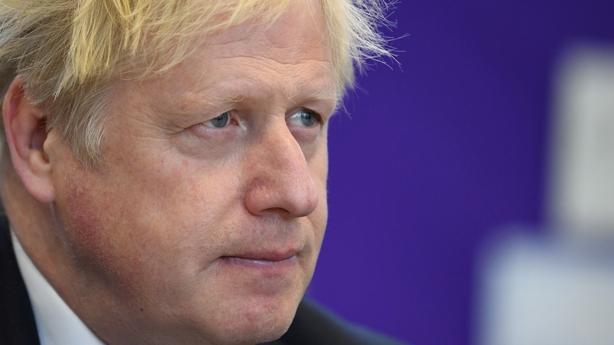
Among grassroots Tories there was anger and frustration that local councillors were paying the price for what they said were the failures of the national leadership.
John Mallinson, leader of Carlisle City Council, hit out after Labour took control of the new Cumberland authority which will replace it.
He told the BBC: "I think it is not just partygate, there is the integrity issue.
"Basically I just don't feel people any longer have the confidence that the Prime Minister can be relied upon to tell the truth."
Ravi Govindia, leader of the Wandsworth Tories, said: "Let's not be coy about it, of course national issues were part of the dilemma people were facing."
That did not deter a jubilant Mr Starmer from proclaiming clear evidence of a Labour revival following its crushing defeat in the 2019 general election.
"This is a big turning point for us," he told cheering supporters in Barnet. "We've sent a message to the Prime Minister: Britain deserves better."
Mr Davey said the Lib Dems stood poised to make further gains at the general election following recent by-election successes.
"What began as a tremor in Chesham and Amersham, became an earthquake in North Shropshire, and is now an almighty shockwave that will bring this Conservative Government tumbling down," he said.
After full results were declared from 175 councils across England, Scotland and Wales, the Tories had lost control of 11 authorities and suffered a net loss of 317 councillors.
Labour had a net gain of eight councils and 177 seats, the Lib Dems had gained five councils and 166 councillors, and the Greens had put on 37 councillors.
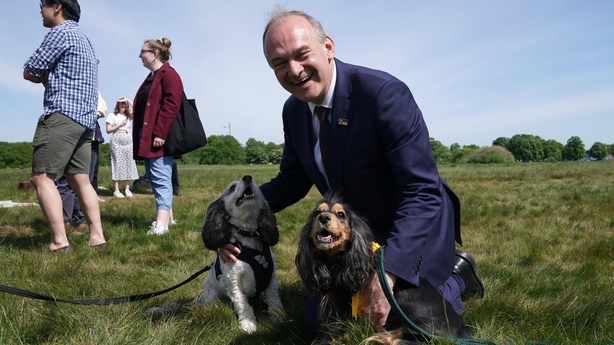
The Conservatives are hoping to extend their 12 years in power for another term at the next general election, which is due by 2024.
Mr Johnson won the last general election in 2019 by a landslide on a promise to take the UK out of the European Union, and reverse rampant regional inequality.
Despite making good on his Brexit pledge, the coronavirus pandemic largely stalled his domestic plans.
But his position has been put in jeopardy because of anger at lockdown-breaking parties at his Downing Street office and the steeply rising cost of living.
Poor results could reignite questions about his leadership, putting his position in jeopardy.
Labour is also bidding to leapfrog the Conservatives into second place in Scotland, behind the pro-independence Scottish National Party (SNP), and remain the largest party in Wales, where 16 and 17-year-olds are eligible to vote for the first time.
Johnson cannot ignore message from voters, says Scottish Tory leader
Scottish Conservative leader Douglas Ross has said Mr Johnson "can't ignore the message" sent by voters.
Mr Ross has faced criticism for backtracking on his call for the Prime Minister to quit over the 'partygate' controversy, citing the need for stability at the top of the UK government due to the Russian invasion of Ukraine.
Speaking to the BBC from the election count in Moray, Mr Ross said: "It's been a difficult night and the results coming in today are very disappointing."
He highlighted gains in Moray and Aberdeenshire, but said: "In too many parts of Scotland, we've lost excellent candidates and councillors haven't been re-elected because it seems many of our supporters decided to sit this one out, to protest and not cast their vote, and we've lost out as a result of that."
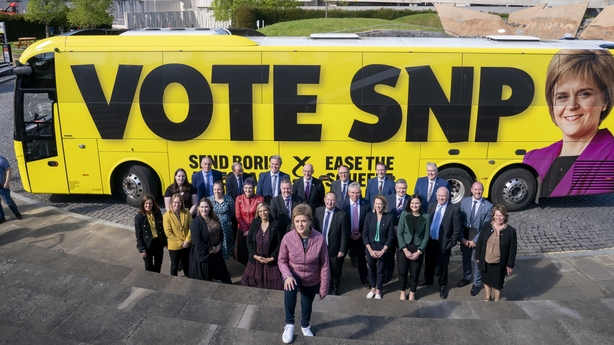
When asked whether he believes Mr Johnson should lead the Conservatives into the next general election, Mr Ross said: "The Prime Minister simply can't ignore the message that's been sent from voters not just here in Scotland, but across the UK.
"The Conservatives lost Westminster Council last night - that's a council that even in the peak Labour years under Tony Blair the party held on to - so there's been a very strong message from the public to the Prime Minister and to the party."
The leader of Scottish Labour has declared "the Ruth Davidson project is dead", as his party celebrated gains in Glasgow City Council.
Anas Sarwar added that "the nasty Tories are back", following previous Conservative success under former leader Ms Davidson.
"It's been almost a decade and it's the first time we've had a cheerful day for the Scottish Labour party," he said.
"It's a good day, we've made good progress. I think by the end of the day we will be in a good second both in terms of vote share and in terms of seats."
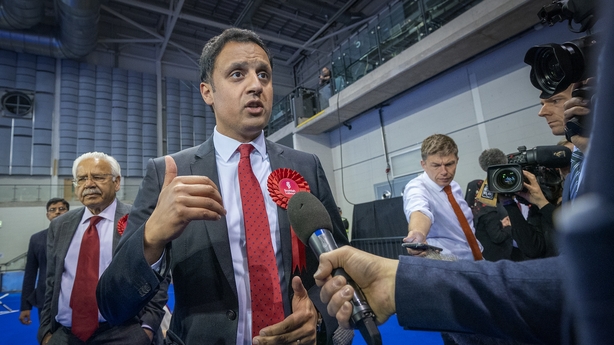
He added that there must be a coalition built in time for the next general election in order to "boot Boris Johnson out" of Downing Street - a vote which he said will be "Boris versus Britain".
Mr Sarwar added: "For well over a decade now, we've had a politics in Scotland where there's been one dominant party, and there's been a Labour party that's been not on the pitch, not been willing to compete, and a Conservative party whose limited ambition has been to come in second place."
He said the gains Labour has seen in Scotland's largest city "demonstrates that over the last five years, the administration in Glasgow has neglected the city of Glasgow".
Mr Sarwar hailed his party for having made progress in the run-up to and following the Scottish Parliament election in 2021, and said he will seek to continue that momentum in a bid to gain more Scottish seats at Westminster.
Tories facing huge losses in Wales
The Conservatives are also facing huge losses in Wales as the results from the local council elections continue to roll in.
In Monmouthshire, the only council the party controls, they are expected to lose seats.
And the party is facing pressure in Denbighshire, which has seen a big swing to Labour and Independent candidates, and Vale of Glamorgan, another Tory stronghold.
All four sitting Conservative councillors in Torfaen have also been ousted.
Meanwhile, Labour wrestled back control of Blaenau Gwent from the independents, also retaining Caerphilly and Newport, although Caerphilly council leader Labour's Philippa Marsden lost her seat by a large margin.
Two other council leaders have lost their seats, both independents, Merthyr Tydfil leader Kevin O'Neill and Blaenau Gwent leader Nigel Daniels.
Labour are looking to maintain their majorities in Swansea, Cardiff and other key seats and appear positive about their chances right across the country.
Plaid Cymru, Wales' nationalist party has held onto Gwynedd and Wrexham has remained under no overall control.
All 22 councils in Wales are up for election this year.
Boundary changes mean there are now 1,160 seats up for grabs.
